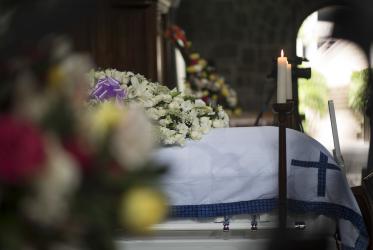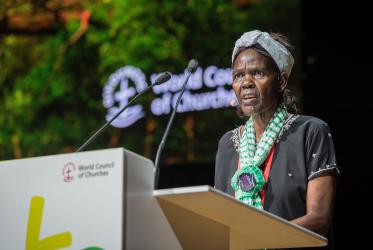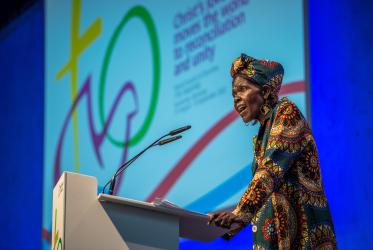Introduction: change and transition
“I hereby command you: Be strong and courageous; do not be frightened or dismayed, for the LORD your God is with you wherever you go.” (Joshua 1:9)
Once more, welcome to the first in-person central committee meeting and the last one before the next general assembly that will be held in August and September 2022. As we gather to pray, reflect, work, and take decisions, our global socio-economic and political reality provides a backdrop of many sounds and contradictory voices that echo fundamental changes. Some of these changes are obvious, while others are not so evident. Nevertheless, we are in a mode of change and transition that is undoubtedly mirrored in the WCC and the worldwide ecumenical movement.
It has often been said that one of the few things in life that we can be guaranteed of is change. This has prompted studies on change management.
The Scottish Anglican hymn writer Henry Lyte puts it best this way in the well-known hymns “Abide with Me”:
Change and decay in all around I see;
O thou who changest not, abide with me.
With the inevitability of change comes a time of transition. It is essential to plan and manage these transitions if they are to benefit institutions.
Organizations such as ours, whose work is guided by the framework of set times, keep operating, mindful of the pending change. Of course, the convening of every general assembly in WCC signals that change is afoot. And while we plan for and make accommodations for the anticipated changes, managing this process is made all the more difficult when the unexpected is added to the already complicated and complex change management task.
We know that in life, we ought to always factor in the unexpected. However, change management becomes even more burdensome when we encounter the unexpected in the finality of death, especially of those with whom we are closely connected and work alongside. Yet, the journey of life continues.
And in this ongoing pilgrimage, with the impending changes, we must remember that God’s abiding presence remains constant. When we remember this, the period of transition that serves as a bridge between the past, the present, and the future does not leave us dejected and demoralized. As Joshua held on to the promise of God,
“Fear not, for I am with you,” so we too hold to this eternal promise.
I aim to share some thoughts on the 11th assembly theme in light of global religious, economic, political, and organizational transitions.
The WCC is no exception to these contextual trends and the requisite organizational changes. The ecumenical movement is challenged to revisit our shared vision for unity - truthfully and realistically - to position the WCC in the global arena as a key faith player in light of the major global trends.
The 11th WCC assembly theme: The theme “Christ’s love moves the world to reconciliation and unity” is an expression of faith and hope in God’s reign as the ultimate destination of creation and humanity, facing together today the threat of their survival.
A key word in the theme is “love.” But does it make sense to use the word “love” in the theme of an international ecumenical assembly today? Isn’t it a word that is used so much, so widely, and in so many different senses that - because it says too much - it ends up saying little . . . or even nothing?
My answer is “yes,” it does make sense to speak of love and of “Christ’s love” in today’s world. I would even add that we have very intentionally placed this word at the centre of the assembly’s theme. Why? Basically, for two reasons.
First, because a World Council of Churches’ assembly theme is always about Christian mission, witness, and unity in prophetic dialogue with the spirit of a particular time. The theme of the first WCC assembly, held in the Netherlands three years after the end of World War II, is a good example: “Man’s Disorder and God’s Design.” It was a timely call to the churches to covenant against war and destruction and for justice, peace, and unity.
In the same way, there is something very timely about the theme of the next assembly. When hate speech is normalized in human communication through social networks; when xenophobia and racism are nurtured by national populisms and their politics of fear; when the poor, who are many, face the consequences of the climate emergency catalyzed by the lifestyle of a few who are rich; when trafficked people and children without identity escaping repression, oppression, and suffering perish in the seas . . . When all this happens, it makes sense to call Christians and churches from around the world to re-envision prophetically their apostolate, their mission, witness, and unity in relation to love, especially in regard to Christ’s love today.
Second, our meditation on Christ’s love will bring “radicality” to the assembly’s reflection on mission, witness, and unity in prophetic dialogue with the spirit of our time.
Assembly daily morning prayer and biblical meditation will illustrate what the author of the first gospel says about Jesus: “When he saw the crowds, he had compassion for them.” In the original Greek, the word for “to have compassion” means “to be touched in one’s guts” by the situation of those who are “harassed and helpless,” those who are on the margins (Matt. 9:36).
Morning prayers, centred on Jesus’ compassion, will provide a spiritual framework for plenary sessions, which will address the dignity of creation, human dignity, the wholeness of life, and our search for visible unity in eucharistic fellowship from a theological perspective.
Jesus’ acts of compassion led to his passion on the cross. The disciples’ memory of Jesus’ compassion also led Saint Paul to write to Christians in Corinth that Christ’s love urged them to engage in the ministry of reconciliation, that Christ’s love moved them and the world to reconciliation and unity (2 Cor. 5:14-19).
As the assembly gathers to reflect on the churches’ mission, witness, and unity in prophetic dialogue with the spirit of our time, Jesus’ compassion for stigmatized minorities, for those for whom little compassion is visible today, will challenge us and our churches to metanoia. The renewal of our minds and hearts will motivate us so that we may become in tomorrow’s world a countercultural force driven by solidarity with the most vulnerable towards the survival of God’s creation, for which so many young people are anxiously struggling today in Germany and in many parts of the world.
In this way, churches will be challenged to seek to overcome their divisions through an “ecumenism of the heart.” This is an ecumenism in which we look at other churches first of all with the eyes of communion in the love of the compassionate Jesus; with the eyes of a common commitment to God’s kingdom, and only look at what separates us from other churches - in matters of ethics or faith - within the solid foundation of that unity in Christ.
Towards visible unity – When we began preparations for a new assembly, our dear brother Metropolitan Gennadios was the first to remind us that a WCC assembly requires a statement on unity, or, as he used to say, a statement on ecclesiology. That was the case in Busan. This is going to be the case in Karlsruhe.
Metropolitan Gennadios was right. As a fellowship of churches covenanted to grow in our imperfect communion, to pray for each other, support each other, and admonish each other when this proves necessary, we must pause in the assembly to ask ourselves what we can say together about our visible witness to our given unity in Christ.
That is the purpose of the statement on unity that you have received and for which I would like to invite your contribution. The proposed statement on unity is motivated by the assembly theme. It builds on the inspiring biblical promise that nothing will separate us from God’s love made manifest in Christ through the Holy Spirit. It refers to patristic teaching to illustrate the practice of Christian love and offers us a harvesting of insights on unity provided by past assemblies. In a world marked by growing inequalities and fast remilitarisation, it calls the churches to mutual humility, to wash each other’s feet and to practice the new commandment in their relations. In short, it calls to “an ecumenism of the heart.”
Towards the 11th assembly
An assembly is not only the highest governing body of the World Council of Churches; it is a spiritual, celebratory, and mutually encouraging gathering of the member churches. It is indeed the most comprehensive and inclusive event of world Christianity in our times. An assembly unfolds its theme through common prayer, Bible studies, thematic plenaries, and reflections on the most important challenges of our time that require clear responses by the churches together. It is the space where the churches set new directions for their common journey towards reconciliation and unity of all humankind and all creation.
When the assembly met in 2013 in Busan, South Korea, the churches called each other and all people of goodwill to embark together on a pilgrimage of justice and peace. We will bring the harvest of this eight-year-long journey to the assembly and decide on the next steps we should take in our common witness of Christ’s love.
Every assembly of the World Council of Churches is a unique reflection of its time. Assemblies have been signposts for the churches since its founding in 1948 in Amsterdam. To be true to our historical context today, we must also confront deep-reaching conflicts and disagreements among the churches in the spirit of reconciliation and unity. In that spirit, the ecumenical delegation under the leadership of the first general secretary of the World Council of Churches, Willem Visser’t Hooft, came to Stuttgart right after the war in 1945. Receiving the Stuttgart declaration of guilt, this delegation opened the door for the German Protestant churches to the way of reconciliation and unity with all member churches of the World Council of Churches.
Examples like these will also remind us in Karlsruhe of the gift of Christ’s love that has the power to move even the world beyond enmity, injustice, war, and violence to reconciliation and unity. That is my hope. That should, in my view, be our expectation for the 11th assembly in Karlsruhe. That is our prayer.
We will continue singing this wonderful song of Per Harling in the coming weeks and months on the theme of the forthcoming 11th assembly in Karlsruhe:
“Christ’s love moves the world to reconciliation and unity. In Christ’s love, there is no fear. The Spirit empowers us to be bold and free!”
No fear, dear friends, esteemed sisters and brothers in Jesus Christ! No injustice, no violence, no war! In Christ’s love, we are free, we can, and we must be prophetic and bold, standing up for justice and peace. That is our call and our mission in this world: to struggle for the dignity of all human beings and the life of all creation. Remember, dignity is a gift and a right given to us by God, the Creator.
Let Christ’s love move us. Let us work for healing, reconciliation, and unity. These words have deep meaning and very practical consequences in the context of our recent experiences of the COVID-19 pandemic, the climate crisis, or violence and war in Ukraine, Ethiopia, and far too many other places. My own limited involvement in peace building and peace negotiations in my region taught me that our hearts must be wide. Our support and solidarity must be with all people who suffer. Christ does not take sides with the armies in a war. Christ is always at the side of the suffering.
My final, personal remarks as the moderator
As the moderator of the central committee of the World Council of Churches, I take this opportunity on your behalf to wholeheartedly thank all those churches and communities in Germany who have invited us to Karlsruhe and are already hosting us in very generous ways. In addition, may I, on your behalf, express our deep gratitude to the German government for their gracious facilitation of this assembly. This gesture makes it possible to secure full participation by member churches.
The work of the WCC and, for that matter, the assembly is made possible by the invaluable and incredible contributions of many committed actors. To begin with, I sincerely wish to thank our member churches and, by extension, the members of the central committee for their resilience during the tragic moment of the COVID-19 pandemic. This includes institutional compliance to their fiduciary role as well as fervent prayers for WCC and the ecumenical movement at large.
I am also grateful to our former general secretary, Rev. Dr Olav Fykse Tveit, currently serving as the presiding bishop of the Church of Norway. The general secretary faithfully delivered the mandate given to him, not least the 10th assembly call to men and women of goodwill and faith to move together on the Pilgrimage of Justice and Peace.
Our present acting general secretary, Rev Prof. Dr Ioan Sauca, has and continues to walk in the same footsteps while adapting to the new challenges.
My appreciation also goes to the members of the leadership of the central committee (LCC) and the executive committee for their careful navigation of their governance roles. We held many meetings made possible because of the team spirit and work and the improved art of listening to each other. This would not have been possible without this central committee’s support and trust, which we cherish. Ecumenical partners and specialized ministries continued to provide essential accompaniment to WCC and member churches in ways that affirm the compassionate love of Christ.
It has been a great honour and privilege to work with the staff leadership group (SLG) and the entire staff team of the WCC, some of whom have blossomed during this period. I thank the staff leadership group for their skilled leadership of the council and their careful preparation of governing body meetings.
I urge us to continue praying, supporting, and participating in the 11th assembly. What did we sing? “In Christ’s love there is no fear. The Spirit helps us to be bold and free!” So I pray for the assembly and all of us: May the love of Christ overcome our fear, may the love of Christ break down all barriers, may it empower us to be bold and free, may it move the world to reconciliation and unity.
In the spirit and ethos of consensus decision-making, let us cultivate a sound spiritual mind together and create an inviting ambience for this final meeting and stage of our pilgrimage together since 2013.
Thank you




